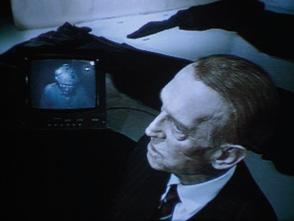
2 minute read
ROBERT KRAMER
Notre nazi
SPHINX CINEMA - ZAAL 3
Advertisement
ZAT/SAT 1 APRIL 11:00
Notre nazi
Robert Kramer
1984, FR/DE, video, English spoken, 114 min
Dit aangrijpend portret werd opgenomen tijdens het filmen van Thomas Harlan’s Wundkanal, waarin Alfred Filbert, een voormalige officier van de Gestapo, een ex-Nazi speelt die ontvoerd wordt door een terroristische organisatie. Kramer observeert hoe Harlan – wiens vader, Veit Harlan, de beruchte antisemitische propagandafilm Jud Süß regisseerde – in een poging in het reine te komen met zijn verleden, gradueel de methodes van de vijand overneemt en zo als het ware zijn eigen ergste vijand wordt. Het is het verhaal van twee Duitse generaties, maar ook van een observerende buitenstaander, die niets van die geschiedenis had meegemaakt maar zich naar eigen zeggen op een abstracte manier met dit verhaal verbonden voelde door zijn joods-zijn. Kramer bestempelde de film zelf als “een waarlijk levende poging om een enigma binnen te dringen.” Kramer benadert en besluipt Filbert als een onbreekbare en ondoorzichtige blok geschiedenis die zindert in het centrum van de donkere opnameruimte en van eenieders aandacht. “Mijn film is misschien een andere fictie: het verhaal van een zekere T., zoon van de grootste nazi-cineast en zelf filmregisseur. Zijn hele leven heeft hij geprobeerd zijn verleden ongedaan te maken. Vandaag draait hij een fictiefilm, hij heeft de hoofdrol gegeven aan een nazi-oorlogsmisdadiger die ongeveer even oud is. Door deze daad maakt T. een hele stortvloed van onvoorziene energie los die de set en zelfs meer dan de set overspoelt.”
This gripping portrait was shot during the filming of Thomas Harlan’s Wundkanal, in which Alfred Filbert, a former Gestapo officer, plays an ex-Nazi kidnapped by a terrorist organisation. Kramer observes how Harlan – whose father, Veit Harlan, directed the infamous anti-Semitic propaganda film Jud Süß – gradually adopts the enemy’s methods in an attempt to come to terms with his past. Thus becoming, as it were, his own worst enemy. It is the story of two German generations, and also of an observant outsider, Kramer, who didn’t experience any of that history but said he felt connected to it in an abstract way through his Jewishness. He himself labelled the film “a really alive attempt to get inside an enigma.” With his camera, Kramer approaches and stalks Filbert as an unbreakable and opaque block of history that seethes at the centre of the dark film studio and of everyone’s attention. “My film is perhaps another fiction: the story of a certain T., son of the greatest Nazi filmmaker, and himself a film director. All his life he has tried to undo his past. Today he is shooting a fiction film, he has given the main role to a Nazi war criminal who is more or less the same age. By this act T. releases a whole torrent of unforeseeable energy which sweeps the set and even more than the set.”
“For me, the film is fundamentally about the question of judgment, about the complexity of a situation. On the one hand, we have Veit Harlan’s son, obsessed with his past and having such an understandable need to disassociate himself from that past and confront it within himself. It shakes up this strangely solid and integrated old man, who we know from the start is guilty of the worst we can imagine. And me, once again, an involved observer on camera. The film goes down some paths that lead nowhere. I’m not sure any of them lead anywhere. But they all revolve around the question of judgment: who has the right to judge? What are the right ways to judge?”



